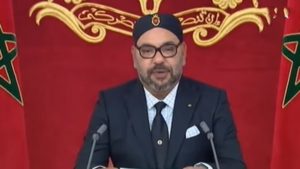 King Mohammed VI underscored Tuesday that the proposed development model should become the cornerstone for the establishment of a new social contract in which all stakeholders will be involved.
King Mohammed VI underscored Tuesday that the proposed development model should become the cornerstone for the establishment of a new social contract in which all stakeholders will be involved.
“I look forward to seeing the proposed development model become the cornerstone for the establishment of a new social contract in which all stakeholders will be involved: the state and its institutions as well as the driving forces of the nation, namely the private sector, political parties, trade unions, civil society organizations and the citizens,” the Sovereign pointed out in a speech he delivered from the Northern city of Al Hoceima on the occasion of the 66th anniversary of the Revolution of the King and the People.
The King said that the new development model will serve as the backbone of the new phase, whose key features will be accountability and a comprehensive take-off.
The Monarch, who insisted that the Moroccan citizen is the heart of the development process, noted that an inclusive, participatory approach is necessary when addressing the major issues of the nation to make sure all key stakeholders are actively involved.
He recalled that it is the same objective he sought through the creation of the ad-hoc committee for the development model.
King Mohammed VI had announced in the latest State of the Nation Address (July 29) the setting up by next fall of an ad-hoc committee for the development model that will make proposals and suggestions on how to improve the development reforms and increase their effectiveness.
He went on to explain that the purpose of revamping the development model and the goals of the projects and programs launched are to ensure Morocco’s advancement, improve the citizens’ living conditions and reduce social and regional disparities.
In his address, King Mohammed VI on the other hand renewed the call to promote the development in the rural areas, support the inhabitants of these areas and respond to their pressing needs, as the populations most affected by difficult living conditions reside, for the most part, in rural areas and in the suburbs.
“I have called, time and again, for measures to promote development in rural areas, through income-generating activities, employment opportunities, faster access to basic social services, in addition to school enrolment measures and initiatives to combat poverty and vulnerability,” he said.
The populations living in rural areas and in the suburbs need further assistance, greater attention should be paid to their conditions, and continued action is required to respond to their pressing needs, said the King, recalling the ambitious six-year program worth $5.2 billion designed to reduce disparities in rural areas.
He urged the populations concerned to be proactive in order to change their status in society and improve their living conditions.
One of the possibilities in this regard is to make sure they benefit from access to education, which is available throughout the country, and from vocational training opportunities and social welfare programs, the Monarch explained.
The King stressed further the need to tap all resources in rural areas, particularly communal agricultural land (sulaliyat land), which should be used for the implementation of investment projects in the agricultural sector.
In the same vein, “we should make the most of the opportunities and possibilities offered in fields other than that of agriculture, such as rural tourism, commerce and local industry,” he said, noting that the aim is to boost and encourage private initiative and self-employment.
